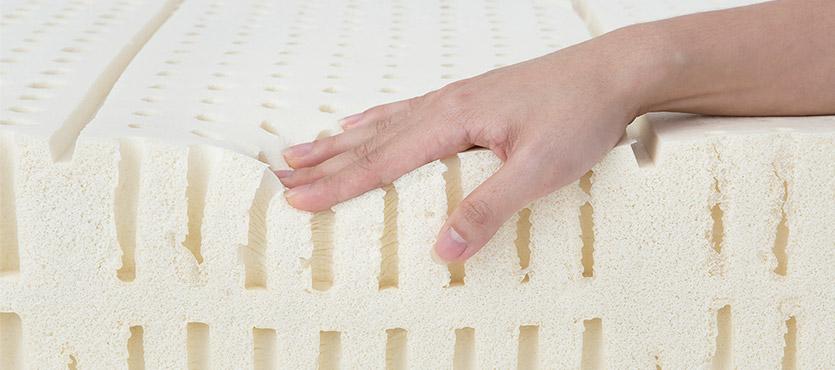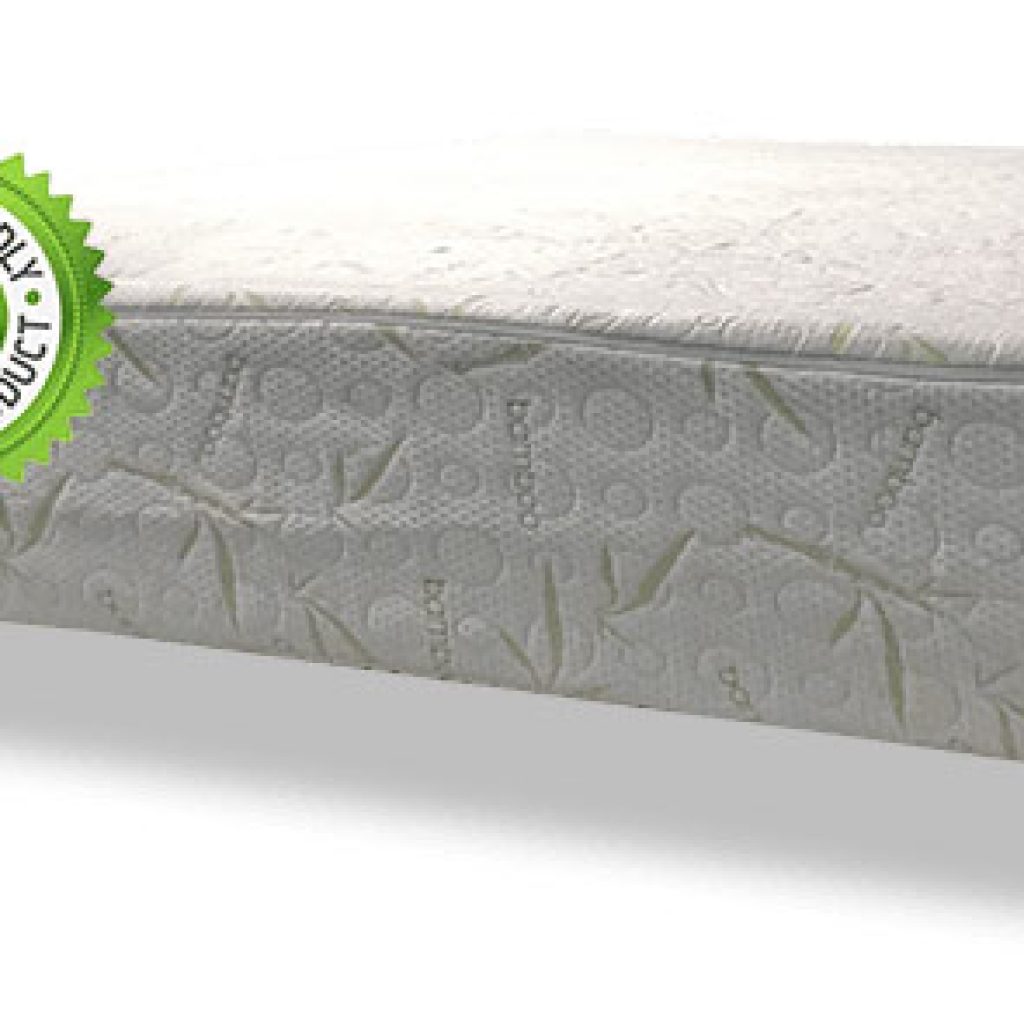We understand the importance of a long lasting mattress and that’s why we only offer 100% natural latex mattresses from certified manufacturers with no synthetic properties or pesticides to help enhance the lifetime of your mattress
How Long Does Latex Last?
| Mattress Material | Average Supportive Lifespan |
| 100% Natural Latex | 25 years |
| Synthetic/Blended Latex | 12 years |
| Memory Foam | 9 years |
| Innerspring | 7 years |
| Standard Foam (i.e. most mattresses in a box) | 5 years |
| Cotton Futon | 4 years |
Typically, a standard mattress will show signs of degradation within the first year and need to be replaced 5-10 years down the track because of common issues such as sagging or staining. The quality of the materials used inside the mattress plays a massive role in how long your mattress will last and how often you need to replace it. In comparison to innerspring mattresses and memory foam, natural latex is a miraculous material when it comes to durability and can keep its natural state for 20+ years with absolutely no sagging. It doesn’t get worn down near as quickly as most other types of mattresses tend to do and will hold its original form even after excessive use.
Note: many mattresses on the market contain several different materials, which can degrade at different rates. The top layer is the most important, as it will degrade the fastest and decrease the support of the mattress.
However, there are factors that you need to take into consideration that may affect the lifespan on your mattress.
The Science Behind Latex Mattresses – Why It Lasts So Long
Natural latex is a remarkable material that is breathable, flexible, and hypoallergenic. It’s one of the only materials that you can really bear down and immediately spring back into place when the tension is removed.
The phenomena behind natural latex can first be identified in its production process, starting from the extraction of the sap from rubber trees to then being whipped in an industrial mixer and solidified at the perfect temperature. The process in mass producing the material varies from each company but they typically use either the Dunlop method or the Talalay method.
The two methods only vary in similarity slightly but produce very small variations of latex in terms of density and durability. The Dunlop method is said to produce a denser type of latex which can last longer in terms of durability than that of a softer Talalay latex.
Our manufacturer at Quokka Beds uses the Dunlop method, which is why we offer different types of firmness levels for our mattress layers with more customizability so the user doesn’t have issues with firmness. We preach about durability but also care for our customers preference in firmness, especially those who want a softer feel to their mattress. The Dunlop method is also less production intensive, uses less additives and therefore is healthier and better for the environment.
Factors Affecting How Long Latex Lasts
Maintenance and Care
Just like everything else in life, if you take care of your mattress, the lifespan will be prolonged severely. The health of your mattress is very important and taking the right steps for maintenance and care is necessary for a long life. Some of these maintenance suggestions can be found below in the “Tips” section.
Material and Manufacturing Quality
When doing diligent research on different latex mattress providers, understanding the quality in both the material being used and how its manufactured is key when trying to work out how long your latex mattress will actually last. The number one thing to avoid when purchasing a latex mattress is any synthetic materials and additives – any synthetic, man made materials degrade a lot faster than 100% natural latex and is harmful to the environment and human health. At Quokka Beds, we only provide natural latex from a certified manufacturer who produces natural latex from their ethically sourced rubber tree plantations. Which supplier a company chooses to buy from is a major factor into how long your mattress will last and should be number one on your research list.
Tip: always try and find certification on a company’s website to help support their organic and natural claims where applicable
User’s Credentials
A user’s weight, size, and sleep style can alter the lifespan of your mattress. This is because the weight distribution of the person sleeping can eventually bear down the latex material after a very long time of usage. For example, a 25kg child’s latex mattress will last a lot longer than that of an 80kg adult’s latex mattress.
Note: this isn’t a short term issue and shouldn’t be a factor of concern when buying a latex mattress.
How Often It’s Used
Majority of people only use their beds for sleeping but some people’s lifestyles may deter from this normality. Typically, the more a bed is used can lessen its lifespan. For example, if a mattress is used in a guest room where it isn’t used very often, it’s lifespan will be increased severely than a normal mattress.
Tips On Extending Your Latex Mattress Lifespan
Taking care of your mattress is something that everyone should do, no matter the claims of durability that any company will preach. To get the most out of your latex mattress, you should follow these following tips:
Avoid exposure to the sun
A lot like other products, sun exposure for latex can be very harmful to the material. If exposed for a long period of time, the UV rays can damage the latex which may result in the material degrading quickly and crumbling.
Proper ventilation
It is recommended to have a bed base with slats for proper ventilation. If the latex doesn’t have the proper airflow it needs, this may result in heat being trapped and a possibility of mildew build up on the bottom cover. Fortunately, the latex itself is mould and mildew resistant, so the main concern if you do not give it adequate ventilation is only the outer mattress cover (ours is removable and washable).
Mattress protector
It’s always a safer option to have an extra layer between you and your mattress, to avoid any damage to the latex should you happen to spill something.
A firm bed base
The weight of a 100% latex mattress is something that needs to be supported by a strong and sturdy bed base with the correct slat width requirements. It is important to prevent the mattress from sinking in between slats with the proper bed base which should have 5-9cm slats with 3-5cm gaps between them. If the mattress sags between the slats for a long period of time, this may cause fundamental damage and reduce its lifespan.
When You Should Change Your Latex Mattress
Even despite its long lifetime, understanding the signs of when you should change your latex mattress is vital for your physical health. If sleeping on a mattress that’s long overdue for a change, you may start to notice issues relating to your physical and mental health. Fortunately, with a 100% natural latex mattress these signs may not even start to appear until well over 20 years later. However, you may then start to notice:
- The latex feels less supportive, without as much ‘bounce back’
- The latex is starting to tear away or looks flaky
- The latex has visible indents or is sagging
Disposing Of Your Latex Mattress
Understanding our environmental impacts and being conscious of our carbon footprint is something to consider when correctly disposing of your mattress. Latex mattresses are a much better choice for sustainability compared to your more conventional mattresses because they’re biodegradable and a lot less harmful for the environment. Disposing of a latex mattress can be easy when you know and understand the different ways you can use the material. Some of these include:
Recycling
Natural latex is 100% recyclable and there are many recycling centres in Australia that offer pick-up and drop off services for a small fee. You can also cut up the latex and use it around your home for your own DIY projects such as using it for carpet underlay!
Donating
If your mattress is still in good condition, another option you can consider is donating it to a charity or organisation for those in need. Some donation options may include homeless shelters, domestic abuse shelters, and charitable organisations including The Salvation Army and Good Sammy’s.
Compost
On average, natural latex can take between 6 months to 4 years to fully decompose which means you can use latex in your compost bins. You’ll need to shred the material into small pieces and use the correct methodology for composting to produce your own organic fertiliser.



